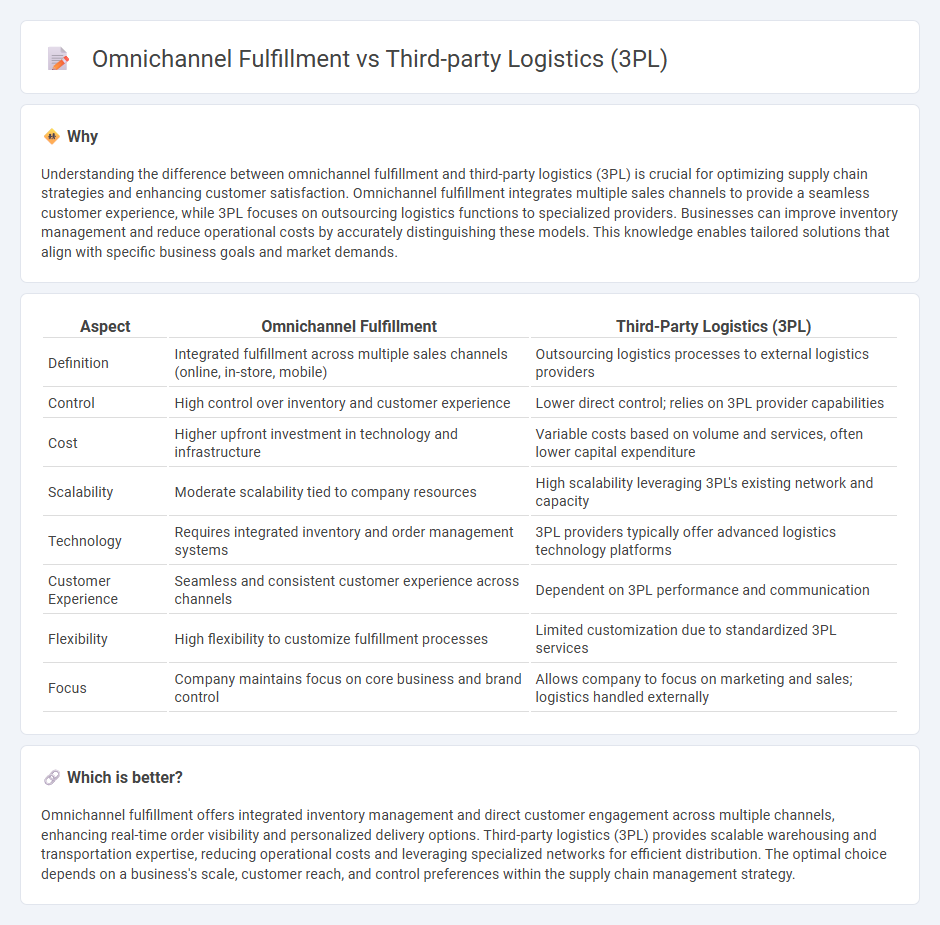
Omnichannel fulfillment integrates multiple sales channels to streamline inventory management and customer delivery, enhancing real-time visibility and customer experience. Third-party logistics (3PL) providers offer outsourced warehousing, transportation, and supply chain management services to optimize operational costs and scalability. Discover how choosing between omnichannel fulfillment and 3PL solutions can transform your logistics strategy.
Why it is important
Understanding the difference between omnichannel fulfillment and third-party logistics (3PL) is crucial for optimizing supply chain strategies and enhancing customer satisfaction. Omnichannel fulfillment integrates multiple sales channels to provide a seamless customer experience, while 3PL focuses on outsourcing logistics functions to specialized providers. Businesses can improve inventory management and reduce operational costs by accurately distinguishing these models. This knowledge enables tailored solutions that align with specific business goals and market demands.
Comparison Table
| Aspect | Omnichannel Fulfillment | Third-Party Logistics (3PL) |
|---|---|---|
| Definition | Integrated fulfillment across multiple sales channels (online, in-store, mobile) | Outsourcing logistics processes to external logistics providers |
| Control | High control over inventory and customer experience | Lower direct control; relies on 3PL provider capabilities |
| Cost | Higher upfront investment in technology and infrastructure | Variable costs based on volume and services, often lower capital expenditure |
| Scalability | Moderate scalability tied to company resources | High scalability leveraging 3PL's existing network and capacity |
| Technology | Requires integrated inventory and order management systems | 3PL providers typically offer advanced logistics technology platforms |
| Customer Experience | Seamless and consistent customer experience across channels | Dependent on 3PL performance and communication |
| Flexibility | High flexibility to customize fulfillment processes | Limited customization due to standardized 3PL services |
| Focus | Company maintains focus on core business and brand control | Allows company to focus on marketing and sales; logistics handled externally |
Which is better?
Omnichannel fulfillment offers integrated inventory management and direct customer engagement across multiple channels, enhancing real-time order visibility and personalized delivery options. Third-party logistics (3PL) provides scalable warehousing and transportation expertise, reducing operational costs and leveraging specialized networks for efficient distribution. The optimal choice depends on a business's scale, customer reach, and control preferences within the supply chain management strategy.
Connection
Omnichannel fulfillment relies on third-party logistics (3PL) providers to efficiently manage inventory, warehousing, and transportation across multiple sales channels, ensuring seamless customer experiences. 3PL partners integrate advanced technology and real-time data analytics to optimize order accuracy and reduce delivery times in omnichannel networks. The collaboration enhances scalability and flexibility, allowing retailers to meet diverse consumer demands while minimizing operational costs.
Key Terms
Outsourcing
Third-party logistics (3PL) providers specialize in outsourcing warehousing, transportation, and distribution to enhance supply chain efficiency, while omnichannel fulfillment integrates multiple sales channels to provide seamless customer experiences. Outsourcing to 3PL allows businesses to leverage expert logistics management and scale operations without significant capital investment, whereas omnichannel fulfillment demands sophisticated technology to synchronize inventory and orders across online and offline platforms. Explore the advantages and challenges of outsourcing in both 3PL and omnichannel fulfillment to optimize your supply chain strategy.
Integration
Third-party logistics (3PL) offers specialized warehousing, transportation, and distribution services, enabling businesses to outsource logistics operations efficiently. Omnichannel fulfillment integrates multiple sales channels, combining inventory management, order processing, and delivery to create a seamless customer experience. Explore detailed strategies to enhance integration between 3PL and omnichannel fulfillment for optimized supply chain performance.
Inventory Visibility
Third-party logistics (3PL) providers specialize in streamlined inventory management, offering real-time tracking and centralized storage to enhance inventory visibility across multiple sales channels. Omnichannel fulfillment integrates inventory data from diverse sources to provide a unified view, enabling accurate stock levels and faster order processing across online and offline platforms. Explore how mastering inventory visibility can transform your supply chain strategies.
Source and External Links
What is 3PL (third-party logistics)? | Definition from TechTarget - A 3PL provider offers outsourced logistics services managing procurement and fulfillment activities, such as warehousing and shipping, allowing companies to control shipping costs and focus on core competencies.
What is a 3PL? Third-party logistics definition, process, and resources - Third-party logistics providers specialize in inventory management, warehousing, order fulfillment, returns processing, and transportation to optimize supply chains and support business growth.
How 3PLs Revolutionize Logistics and Supply Chain Management - 3PLs are specialized companies that outsource supply chain functions like transportation, warehousing, and order fulfillment, helping businesses improve efficiency and focus on core activities.
 dowidth.com
dowidth.com